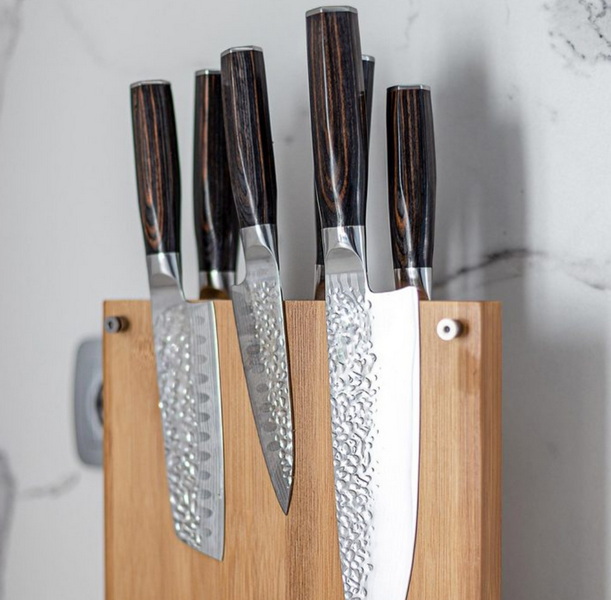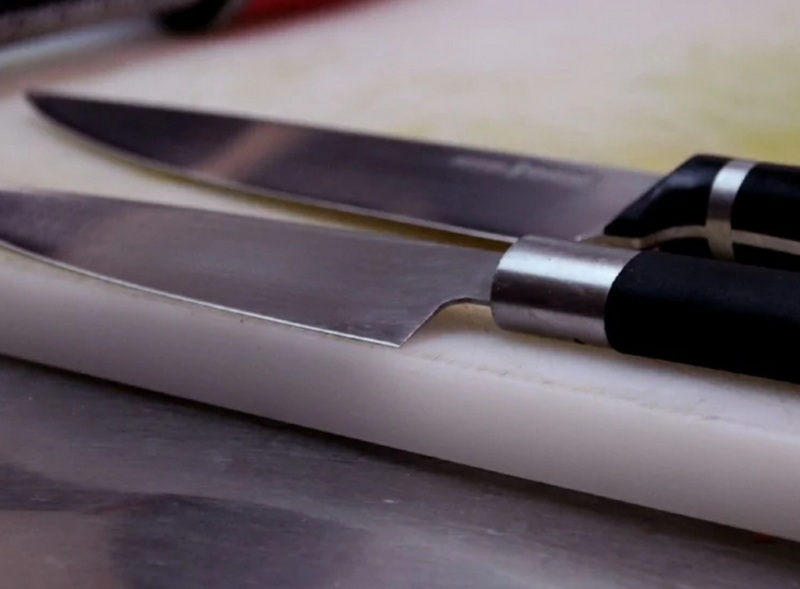Views: 222 Author: Ann Publish Time: 2025-10-13 Origin: Site











Content Menu
>> Unique Characteristics of Damascus Knives
● What Is a Stainless Steel Knife?
>> Key Features of Stainless Steel Knives
● Damascus Knife vs Stainless Steel Knife: Side-by-Side Comparison
● Detailed Insights Into Damascus Knives
● Detailed Insights Into Stainless Steel Knives
>> Practicality and Convenience
● Which Knife Is More Sustainable?
● Selecting the Right Knife for Your Kitchen
● Maintenance Tips for Damascus Knives
● Maintenance Tips for Stainless Steel Knives
● Frequently Asked Questions (FAQ)
>> 1. Are Damascus knives better than stainless steel knives?
>> 2. Do Damascus knives rust easily?
>> 3. Which knife is easier to maintain?
>> 4. Can Damascus knives be used for all kitchen tasks?
>> 5. Are Damascus knives worth the higher price?
Choosing the right kitchen knife is essential for achieving both precision and efficiency in food preparation. Among the popular options, Damascus knives and stainless steel knives stand out for their unique characteristics, benefits, and applications. This article explores their differences in depth, helping you decide which blade is better suited for your kitchen needs.

A Damascus knife is crafted by layering multiple types of steel, typically combining high-carbon steel with softer stainless steel or other metal alloys. This process, known as pattern welding, creates distinctive flowing, wavy patterns on the blade surface, admired both for function and art. Traditional Damascus steel originated from ancient forging practices of 'Wootz steel,' famous in historical Middle Eastern metallurgy. Today's Damascus knives use advanced metallurgical techniques to produce blades that balance sharpness, strength, and beauty.
- Aesthetic Appeal: Each Damascus blade bears a unique woodgrain or watery pattern due to its layered construction. This makes every knife visually striking and one-of-a-kind.
- Edge Retention: The hard core steel layers impart excellent sharpness and edge retention, often achieving Rockwell Hardness Ratings (HRC) between 52 and 60.
- Durability and Flexibility: The layering method enhances toughness while maintaining some flexibility, which reduces the risk of chipping or breaking.
- Maintenance Needs: Despite their durability, Damascus knives require careful maintenance to avoid corrosion, as some layers may be prone to rust.
Stainless steel knives are made from alloys primarily composed of iron, carbon, and chromium (usually 12% or more chromium). Chromium imparts significant rust and corrosion resistance, making these knives ideal for everyday kitchen use. Unlike Damascus knives, stainless steel blades are generally solid steel without multiple layers or patterns.
- Corrosion Resistance: The primary advantage is excellent resistance to rust and staining, simplifying care routines.
- Toughness: Stainless steel knives are less brittle and more resistant to impact damage such as chipping and breaking.
- Smooth Finish: The blade surface is shiny and uniform, with a polished, clean appearance.
- Ease of Maintenance: These knives require minimal upkeep and are dishwasher safe (though hand washing is recommended for longevity).
| Feature | Damascus Knife | Stainless Steel Knife |
|---|---|---|
| Blade Appearance | Distinctive layered patterns, unique and decorative | Smooth, shiny, and uniform surface |
| Sharpness | Typically sharper edge with better retention | Sharp but may dull faster |
| Durability | Tough and flexible but prone to rust without care | Highly resistant to rust, less prone to damage |
| Maintenance | Requires careful cleaning, drying, and oiling | Low-maintenance, easy to clean |
| Edge Maintenance | Can hold edge longer but requires expert sharpening | Easier to sharpen but may need frequent honing |
| Price Range | Generally more expensive due to craftsmanship and art | More affordable and widely available |
| Suitability | Best for enthusiasts and professionals valuing aesthetics | Ideal for everyday cooks needing durability |
The crafting of a Damascus knife is an art as much as a science. The blacksmith repeatedly folds and welds different steel layers—sometimes dozens or even hundreds—to achieve the signature blade patterns and mechanical properties. These methods result in complex “watered” or “wood grain” patterns that are loved by collectors and chefs alike. This meticulous process explains why Damascus knives command higher prices.
Damascus knives excel in precision cutting tasks. Their sharper, harder edges allow for cleaner, smoother cuts into vegetables, meats, and fish, which can enhance presentation and recipe quality. Their layered flexibility also reduces the risk of chips, a common issue with very hard, brittle blades.
Because Damascus knives often use a mix of steels—some of which can oxidize—they require more maintenance than stainless steel knives. Wiping them clean immediately after use, drying thoroughly, and occasional application of mineral oil protects the blade from rust. Avoid prolonged exposure to acidic ingredients or moisture.

Stainless steel knives dominate most commercial and home kitchens because of their balance of qualities. Their strong corrosion resistance means no complex upkeep is necessary, making them a convenient, low-maintenance option. This makes stainless steel perfect for busy kitchens where knives endure frequent washing and heavy use.
Stainless steel knives come in many grades and compositions, with some high-end variants rivaling Damascus in performance. Their toughness and resistance to damage allow them to handle heavier kitchen tasks, including cutting through tougher ingredients or bones (depending on the blade type).
Maintaining stainless steel knives is straightforward. Routine washing, drying, and sharpening are usually sufficient. While less sharp than Damascus knives out of the box, they can be quickly honed or sharpened to restore cutting edges.
In terms of long-term sustainability, stainless steel knives often have an edge due to easier recycling processes for homogeneous metals. Damascus knives' layered structure and specialized forging may complicate recycling but generally last a lifetime if cared for well.
Choosing between a Damascus knife and a stainless steel knife depends largely on your priorities:
- If Aesthetic and Edge Sharpness Are Key: Choose a Damascus knife for its distinct beauty and superior edge quality.
- If Durability and Low Maintenance Are Preferred: Stainless steel knives are ideal for rough kitchen environments and easy upkeep.
- For Professional Culinary Use: Many chefs own both, using Damascus knives for delicate, precise work and stainless steel for heavy-duty tasks.
- For Budget Considerations: Stainless steel knives typically provide great value and performance at a lower cost.
- Always hand wash immediately after use with mild detergent.
- Dry thoroughly; never leave soaking or wet.
- Apply a light coat of mineral or camellia oil periodically.
- Store in a dry environment, ideally in a knife block or sheath to protect the blade.
- Use suitable sharpening stones or seek professional sharpening to maintain the blade edge.
- Wash and dry after every use; avoid dishwasher if possible.
- Regularly hone to realign the blade edge.
- Sharpen when dull using appropriate sharpeners.
- Store properly to avoid contact damage and maintain edge integrity.
Both Damascus knives and stainless steel knives offer unique advantages that suit different kitchen needs and user preferences. Damascus knives shine as artistic, high-performance tools prized by enthusiasts and professionals who love sharpness and aesthetics but require more care. Stainless steel knives provide a practical, durable, and low-maintenance alternative ideal for everyday kitchen tasks and versatility. Understanding your cooking style, maintenance willingness, and budget helps determine the best choice for your kitchen.

Damascus knives generally hold sharper edges longer and have unique patterned designs, but require more maintenance compared to stainless steel knives.
Yes, Damascus knives can rust without proper care, including immediate cleaning and occasional oiling to prevent corrosion.
Stainless steel knives are easier to maintain due to their excellent resistance to rust and minimal care needs.
Yes, but they are best suited for precise cutting and delicate tasks. For heavy-duty chopping, a stainless steel knife might be more durable.
For those valuing craftsmanship, unique aesthetics, and sharpness, Damascus knives are worth the investment. For budget-conscious users, stainless steel knives offer great value.
The Ultimate Professional Knives for Halal Butchery in Middle Eastern Kitchens
Chef Knife Size Guide: Choosing Between 6″, 8″, 10″, And 12″
Custom Knife Handles: How To Design A Chef Knife That Fits Your Hand Perfectly
Chef Knife Surface Treatments Guide: From Polished Migaki To Damascus Patterns
Inside Our Professional Knife Sample Room: Quality You Can See
Universal Knife Block Buying Guide: Modern Acrylic & ABS Knife Holders for Professional Kitchens
Universal Knife Block: The Complete Guide To Modern, Hygienic Knife Storage
The Complete Guide To Red Handle Knife Sets: Style Meets Functionality in The Kitchen
Professional Knives for Halal Butchery And Middle Eastern Cuisine